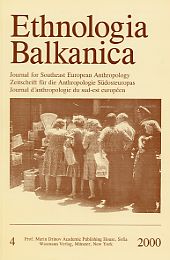»Defizitäre Waren«, Konsumentenerwartungen und »Beziehungen«. Einkaufen in der sozialistischen Konsumgenossenschaft
“Scarce Consumer Goods”, Consumer Expectations, and “Connections”: Shopping in the Socialist Consumer Cooperative
Author(s): Gabriele WolfSubject(s): Customs / Folklore
Published by: LIT Verlag
Keywords: Raduil (village in Bulgaria);
Summary/Abstract: In socialist Bulgaria, the supply of consumer goods was organised by means of a supply system that was very hierarchical and functioned in a limited way. In the villages, the shops of the local consumer cooperatives, as the last links in the chain, were responsible for the sale of consumer goods. The goods, however, were usually available neither in the desired quantity nor quality. The function of local retail trade, fulfilled by the cooperatives, was to provide goods that were 'outside’ the pure subsistance needs of the villagers that were provided by their (small) private plots. In addition, people always had the possiblity to barter for certain needed goods. Thus, in contrast to the urban situation, shopping in the village had lesser significiance – depending, of course, on the kinds of consumer goods required – and was always supplementary to other economic activities. The general problem for the population, to obtain “deficitni stoki”, scarce consumer goods, which the wholesale trader or the retailer were unable to supply, never disappeared during the socialist period. The historical development of the cooperative in the Bulgarian mountain village of Raduil provides an example of the activities and problems faced by a village institution that was totally dependent on superior organizations of planning and distribution. The demands of the local population were evident, directly or indirectly, in the annual cooperative reports during the entire socialist period. Such reports documented deficits, complaints, conflicts, and accusations, and the attempts of the responsible functionaires to deal with them. They reveal problems not only of supply but also the value orientations of the consumers, and the strategies that consumers adopted to reach their goals. The actions and reactions of the villagers as functionaires, employees, and workers of the cooperative on the one hand, and as customers, clients, and consumers of goods and services of the cooperative trade and gastronomy on the other hand, provide an important insight into “real socialist” everyday life which continues to have its effect today. The article is based on comprehensive field data gained in 1993–98 and on archival materials from the local institutions.
Journal: Ethnologia Balkanica
- Issue Year: 2000
- Issue No: 04
- Page Range: 91-116
- Page Count: 26
- Language: German
- Content File-PDF

